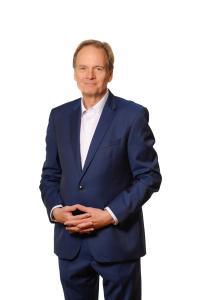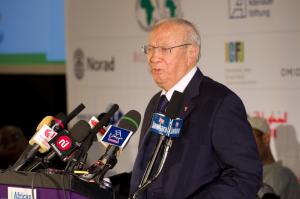AMLF 2011: Annual Highlight to Africa's Top Media Executives - Media Programme Sub-Saharan Africa
Event Reports
Trevor Ncube, board member of the host and KAS partner, African Media Initiative (AMI), ran with the ball in his welcome address:”Who would have thought a year ago that we would meet here now in Tunis?” Prime Minister Beji Caid el Sebsi added in his introduction and the following question time that the media plays an important and critical role in Tunisia. As a politician one must be able to tolerate that, “even if I don’t always think the journalists are right.” A critical press, he clarified, is better than no press. Several camera teams jostled forward to film the Prime Minister’s speech, which was shown on Tunisian television. Overall, more than 350 participants from 48 countries had gathered in full assembly, a record attendance in the fourth year of the AMLF.
Previously, AMI and KAS Media Africa had planned and supported competing pan-African media conferences. In the spring of 2011 both organizations, under direction of Amadou Mahtar Ba (AMI) and Markus Brauckmann (KAS Media Africa), agreed to join forces and arrange a joint event for private media owners and professionals under the banner of the African Media Leaders Forum. The goals are clearly defined: to support the development of the media within the context of democratisation, to enable or strengthen the exchange between regional players, to anchor relevant future topic such as digitalisation strongly in thought and action, to discuss the social, economic and financial challenges of the media owners and to identify solutions, to make KAS Media Africa’s substantive priorities more accessible to a broader audience and, finally, to offer Tunis as an inspiration to the participants from the media.
The target audience that had gathered at the conference were largely media owners as well as leading experts and representatives of media development work, including: Trevor Ncube (publisher, Mail & Guardian), Kim Norgaard (CNN bureau chief, Africa), Eric Chinje (World Bank), Said Ali Laswad (The Tripoli Post) and Emna Ben Jamme (Tunisian blogger). The participants came from all corners of Africa, particularly the French-speaking countries. The conference was translated into both French and English, thus doing justice to its regional role. Inspired by the Arab Spring, the conference was titled, “What future for traditional media?” and the focus was on the role of social media and citizen participation in the media and communication process.
On the first day the participants met to discuss and debate the key topics. Questions ranged from, “Are traditional media still relevant?” to mobile technology, to the future of advertising revenue, all carefully selected by AMI and KAS Media Africa in regards to the needs of the media owners.
In addition, Amadou Mahtar Ba from AMI presented the future initiative, African Innovation News Challenge, which is funded by, among others, the US State Department, Google and KAS Media Africa. One million dollars will go toward the support of ten innovative digital pilot projects in African editorial departments. Small agencies as well as large concerns can apply. The winners will be announced at the next AMLF in 2012.
AMI and KAS had thought long and hard regarding the format for the event, and the result was that the participants were split up on the second day into three different ‘streams’. They had the choice of ‘Revenues and Business Development’, ‘Media Technology and Innovation,’ as well as ‘Ethics and Leadership.’ Based on the building block principle, each of these three key topics consisted of four sessions where experts shared their knowledge, insights and achievements with the group. All the considerations revolved around the main question, “How to help private media owners play their role within the context of democratisation.” These sessions were characterized by their practical approach. For example, Tim Legg, a successful operator of several online services and employer of thirty journalists in Johannesburg, demonstrated step-by-step how to earn a living from the media.
Through the sessions the regional media programme of the KAS was able to press ahead with its goals and, at the same time, communicate them to the local decision-makers. To cite three topics, for instance: Justine Limpitlaw, author of the KAS project, “The Media Law Handbook for Southern Africa”, appeared twice and explained the central challenges for media law in the region. Markus Brauckmann from KAS Media Africa led the session on the future of television, against the background of his commitment to web-TV, or Political Communication 2.0, in Sub-Saharan Africa. Finally, Chris Roper, online editor-in-chief of the Mail & Guardian, discussed to what extent investigative journalism can be refinanced in the 21st century.
The closing event of the conference brought all the participants together again in full assembly and was based on two pillars. Speaking first to the participants was Mo Ibrahim, a successful and well-known businessman from the region as well as a role model for many (media) enterprisers in Africa. His Mo Ibrahim Foundation, along with the Bill and Melinda Gates Foundation and the African Development Bank, was one of the event’s sponsors. He praised the AMLF as pioneering: “Your solidarity is important and will protect you.” He called on the media owners to withstand the political and economic pressure, “with self-confidence.”
At the end, the AMLF Declaration from Tunis 2011 was passed. The document not only expressly thanks the Konrad Adenauer Stiftung for its constructive role, but also the authors first and foremost identify the future challenges facing the African media, including: securing revenue and cash flow for the media companies, encouraging sound governance, generating more stories from Africa for Africa, and strengthening and digitally expanding the role of traditional media on the continent.
Speaking of digital, the event was accompanied by an in-house news team that released its current reports on amlfnews.org, against the odds facing the local internet in Tunis. In addition to the online classics, Twitter and Facebook, videos appeared on YouTube, audio recordings on soundcloud.com, photos on flickr.com and conference presentations on “slideshare”. A book publication from the AMLF is planned for the first quarter of 2012.
Drawing on the participants’ feedback, Amadou Mahtar Ba reached a positive conclusion of the organizer, AMI. (See several of these reactions in the KAS video about the conference). He also particularly praised KAS Media Africa.” The AMLF has undoubtedly established itself as the leading conference on the continent. This growth and success would not be possible without the collaboration with the Konrad Adenauer Stiftung.” Markus Brauckmann agreed, “The cooperation not only reached its essential goals, it exceeded them. We are already looking forward to the AMLF 2012.”




